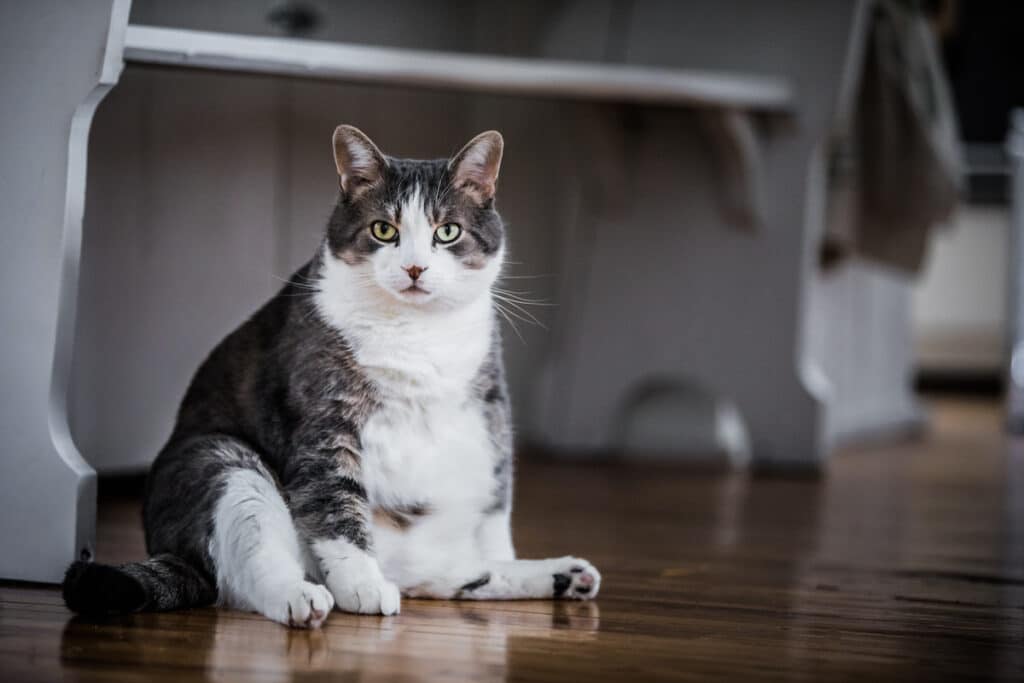What causes bloating in cats?
Cats are experts at concealing illness until it might become severe. The cat needs to be taken to the vet right away if it starts to exhibit symptoms like pain, sudden weakness, attempts to belch or vomit, or trouble breathing.
Bloating in cats is a potentially fatal disorder. Bloating can happen as a result of a number of underlying medical conditions, or it can happen as a result of the cat overeating or drinking too much water. Because the cat’s organs are being compressed, making it difficult for the animal’s body to function normally, the condition, if not identified early, can be fatal. If the cat’s bloated stomach becomes too big, it might be difficult for it to breathe.
Symptoms of Bloating in Cats
Cats frequently exhibit a number of symptoms that can alert the pet owner to a serious issue. Knowing the symptoms of the cat can help the pet owner more accurately describe the cat to the vet until the vet is certain of the exact cause of the bloated stomach:
- attempts to belch or vomit repeatedly
- enlarged stomach and abdomen
- Drooling
- Lethargy
- Pale gums
- Lower body temperature
- breathing difficulty and a swift heartbeat
- Sudden weakness or collapse
The following signs may appear if the cat has gastric dilation and volvulus (GDV):
- Depression
- Signs of pain and shock
Causes of Bloating in Cats
While not common, there are several reasons why kittens and cats’ stomachs might become bloated:
- gastrointestinal parasites
- retaining excessive fluid
- Overeating (if this is chronic, an underlying disease may be the cause)
- Constipation
- Indigestion
- Swallowing too much air while eating
- blockage of the stomach’s last valve
- Volvulus and dilated stomach (the stomach twists, then swells)
- Feline infectious peritonitis (FIP)
- Kidney disease
- Liver disease
One of these factors can lead to mild to severe stomach bloating in kittens:
- Toxic milk syndrome is caused by an infection in the mammary glands or uterus of the mother cat. incorrectly blended milk substitutes
- bad substitute milk or unusual cat milk
- Cat food contains too many carbohydrates
- Congenital defects
- parasitic infections
- Insufficient beneficial bacteria in the gut
- Combining inflammatory bowel disease with healthy intestinal bacteria
Diagnosis of Bloating in Cats
A cat with stomach bloating is given a thorough physical examination by the doctor, who notes every symptom. The veterinarian may also perform further diagnostic procedures, such as taking X-rays, examining a stool sample, or performing a urinalysis, which can help rule out other ailments. If the cat has intestinal worms or parasites, the veterinarian can determine from the stool sample. The veterinarian can determine whether the cat has another illness by using a complete blood count (CBC) and systemic bloodwork.
Additional cat testing may be required to confirm or rule out underlying illnesses, such as liver or kidney disease, if the vet develops a suspicion that they are the cause of the cat’s bloating. Even constipation may alert the vet to other, more serious conditions like an intestinal blockage or tumors.
Treatment of Bloating in Cats
As soon as the veterinarian gets a certain diagnosis, the animal should start receiving treatment for an enlarged stomach. The sole treatment for gastric dilatation and volvulus (GDV), though it is quite uncommon, is urgent surgery. The stomach is physically straightened out by the surgeon. The surgeon should carefully examine the stomach during surgery to make sure no additional injuries have occurred. The cat is more susceptible to repeat incidents after experiencing GDV. Due to this, the vet may sew the stomach to the abdominal wall to lessen the possibility of a future twisting incident.
The proper deworming medicine can be used to treat intestinal parasite-related bloating. A separate treatment will be required to treat the cat or kitten’s protozoal parasite infestation. The enteric coronavirus, or FIP, can be treated for panleukopenia and diarrhea, but the prognosis for a cat or kitten with feline infectious peritonitis (FIP) is not as good. Interested in learning which health plan is best for your dog? Visit Forbes’ analysis of the top pet insurance packages.
Recovery of Bloating in Cats
When intestinal worms, parasites, or overeating are to blame for a cat’s bloated stomach, the cat should make a full recovery and return to its regular, happy life. To prevent a new infestation that might lead to additional episodes of bloating, cats with worms or parasites may require preventive treatments.
The owner of the cat should alter some daily habits and watch the cat closely as well. Overeating can increase the cat’s stomach size and increase the likelihood of a subsequent bout of bloating. Given this information, the cat’s owner should give him several smaller meals throughout the day as opposed to just two or three larger ones.
Cats may scavenge food from other places, such garbage cans, if they are permitted to roam free outside. Gas and bloating are potential side effects of the new cuisine. The cat should be retrained to live indoors if the owner is aware of the cat’s propensity to do so.














